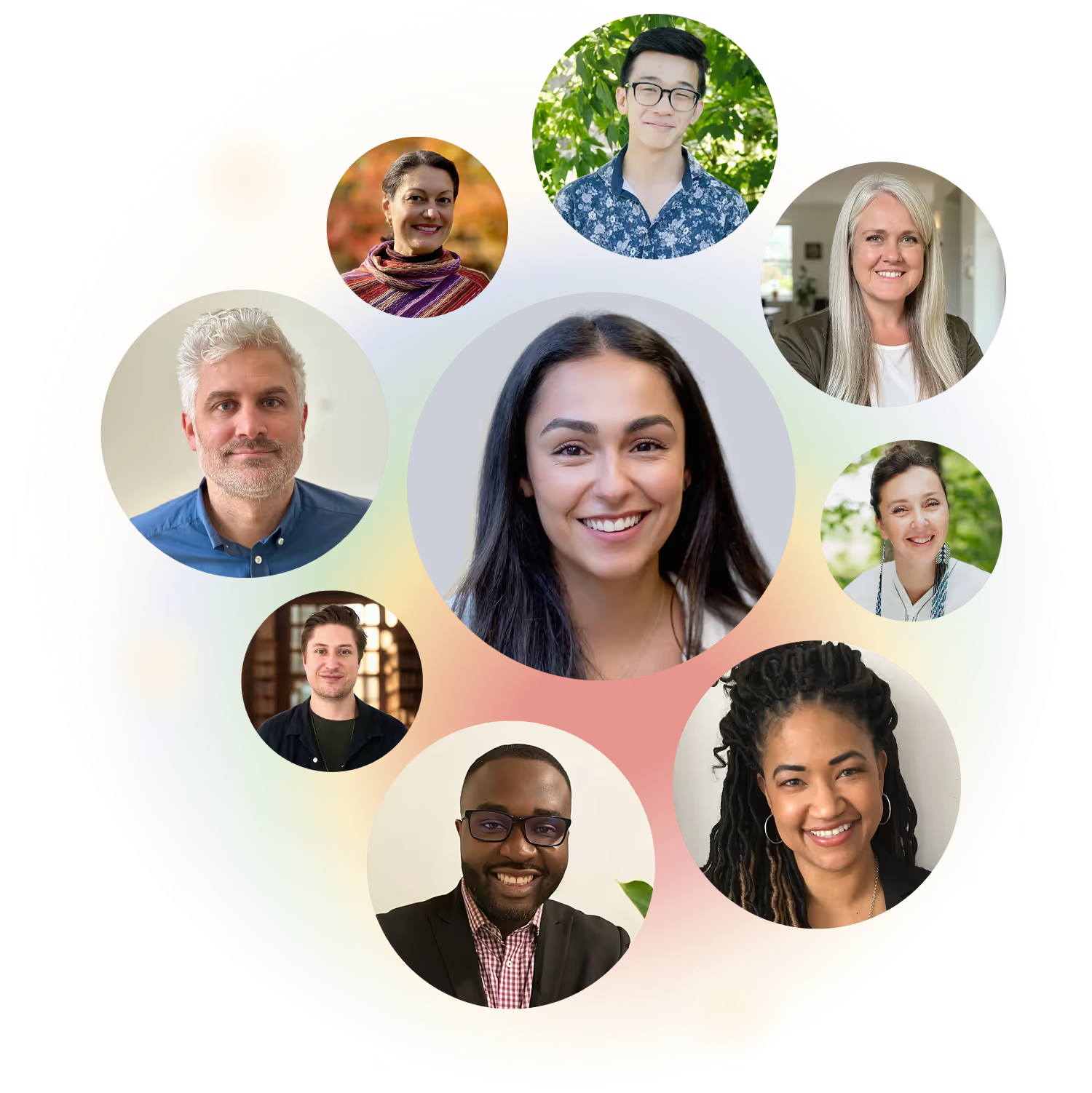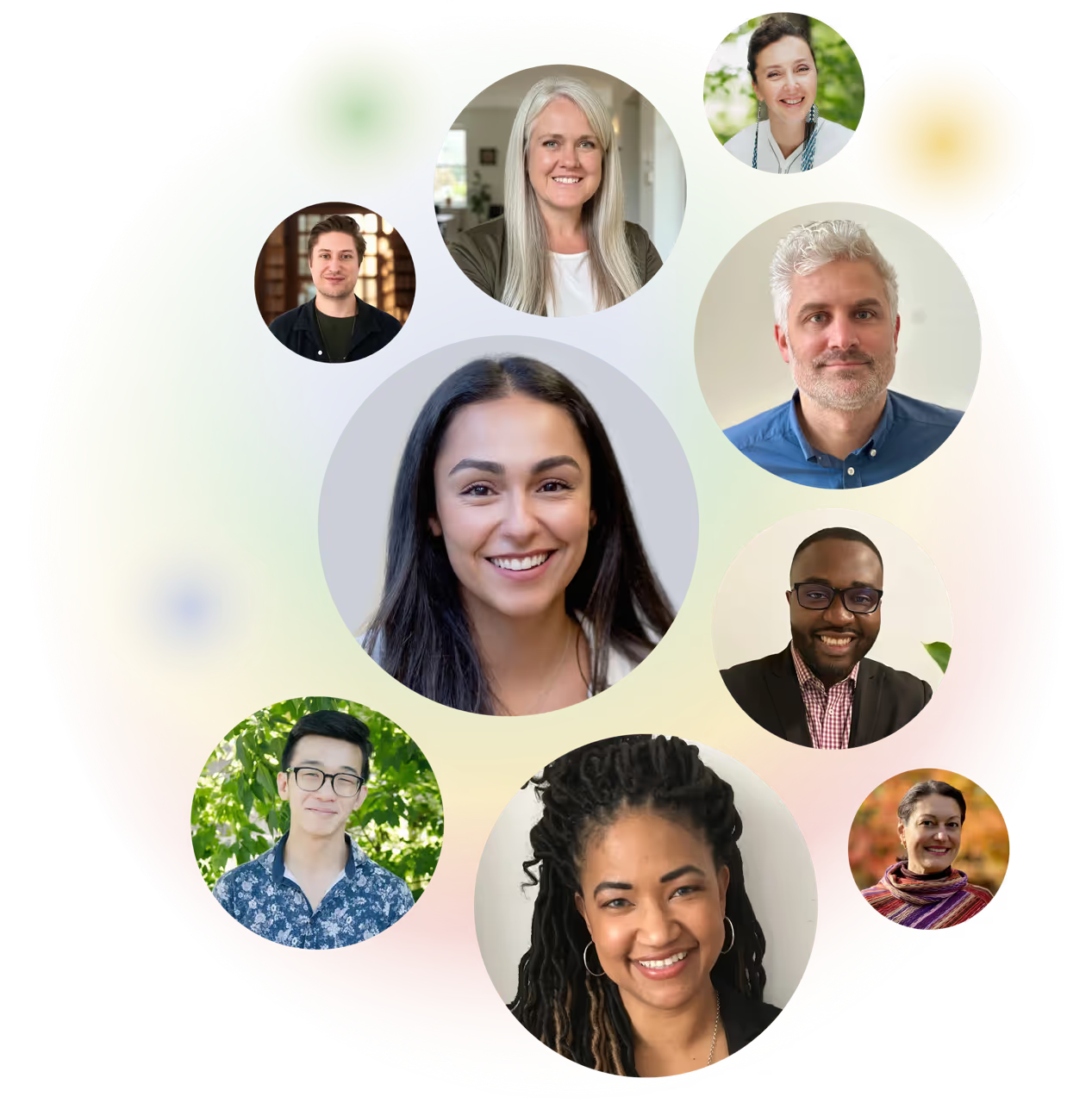Best Teen and Youth Therapists and Counsellors in Vancouver
Youth Counselling in Vancouver through First Session is your bridge to a therapist who champions your child's future.

Therapists
Heading

Heading

Therapy is hard work.
Frequently asked therapy questions
Anyone can book an appointment with a counsellor. You do not have to wait until your symptoms are “bad enough” to start looking into counselling.
While some people are referred to counselling, many people begin the search on their own for individual counselling. If you’re a parent or caregiver, you might be seeking counselling on behalf of someone else. Like adults, teens struggle with everyday life challenges and very real mental health conditions too. Importantly, teen years are often when diagnosable mental illnesses tend to arise—according to the World Health Organization, half of all mental health conditions start by the age of 14.
For parents, it can be difficult to know if emotional or behavioural challenges are regular teenage moments, or something more. But, struggles at school or difficulty maintaining friends are signals to watch out for. At the end of the day, talking to someone to manage and maintain mental health is beneficial; and if anything seems wrong, consider looking into teen and youth counselling.
You can easily browse counsellors on First Session in those categories and more:
Finding a counsellor that is focused on your demographic can be effective. For example, there are more counsellors available now who focus on historically underrepresented demographics. First Session lists therapists who specialize in LGBTQ2IA+ therapy or BIPOC therapy, and more. When a counsellor understands your lived experiences, they’re often better able to understand your obstacles and challenges, and can offer insights that are sensitive to those issues—this can be helpful, but not a must.
In British Columbia, three types of therapists are regulated by law—psychiatrists, psychologists and social workers. This means that they must meet certain education and training requirements to practice under those titles, and they must be registered and licensed by the relevant governing body (known as a college) for their designation.
Psychotherapists, therapists or counsellors in BC do not yet have the same regulations overseeing them—regulations are coming soon for the title of Counselling Therapist. Look for titles like Registered Clinical Counsellor (RCC) or Certified Clinical Counsellor (CCC). These are credible practitioners that belong to self-governed professional associations. There are other titles overseen by associations across BC—take some time to review them and their requirements if you come across other titles. You could also receive psychotherapy or counselling therapy from another regulated practitioner, like a psychologist or social worker.
First Session carefully vets all therapists and counsellors to ensure they meet requirements in their region and are certified by the correct legal or self-governing bodies.
Psychiatry is a medical field of study. Psychiatrists can prescribe medications. Usually an appointment would require a referral from a doctor and it’s unlikely you will be able to book counselling time with them.
Psychologists in Vancouver will hold a PhD. Psychologists can either work directly with patients or clients offering counselling or psychotherapy, or they might remain in academia conducting studies and furthering research in the field of mental health. Psychologists can identify and diagnose mental health conditions but they cannot prescribe medication.
It’s a common misconception that social workers in Vancouver are only available via community or social services. Social service workers differ from social workers. Registered Social Workers (RSW) are counsellors. They can work in a variety of settings, like hospitals, or they can be booked directly for counselling therapy, including on First Session. Those with a title of Registered Clinical Social Worker (RCSW) have additional training and certification which allows them to diagnose mental health disorders using the Diagnostic and Statistical Manual (DSM-5).
You can book counselling appointments on First Session with social workers, counsellors or psychologists in Vancouver.
A number one question people have before seeking counselling is: “how much does therapy or counselling cost?”
In British Columbia, the types of counselling covered by provincial healthcare plans (MSP) include psychiatrists via doctor referral, or receiving counselling directly in a medical setting such as from your family doctor or in a hospital. The provincial government does, however, have a resources page available with a number of affordable and accessible mental health care options.
Otherwise, you can expect therapy costs out-of-pocket in the range of $50 to $300+ per session. Your counsellor’s years of experience, their location, level of education and training will dictate their fees. For example, a new counselling therapist might charge $50 or $75 per session, but seasoned psychologists will likely fall into the $200 to $350 range.
You may be able to access therapy and counselling coverage by workplace insurance benefits to help offset costs. If you have health benefits through your employer, check your benefits booklet or chat with your insurance provider to better understand your coverage. Importantly, your employer is not notified of your usage. Typically you pay for your session first and then submit your bill as a claim to your insurance provider for reimbursement after.
If you don’t have coverage through an employer, costs can be a barrier for many. There are therapists and counsellors who offer affordable and sliding scale therapy to make counselling accessible for more people. Usually, a counsellor will allocate only a certain number of discounted sessions per month. You’ll see clearly on First Session which counsellors offer sliding scale appointments, but you should always feel welcome to ask. If a counsellor cannot provide a discount, they may have other solutions available or can point you to other resources.
When booking in-person counselling in Vancouver, you can expect to see a counsellor in a private office, home office, clinic, centre, or shared office space. However, it is becoming more common to find online counselling in Vancouver, especially after the onset of the COVID-19 pandemic. Virtual appointments allow clients and counsellors to connect via the phone or video chat with more flexibility. Some counsellors use specific digital platforms for online appointments, and others may connect with you via Zoom or Skype.
To book either online or in-person counselling, you can contact a counsellor’s office directly or you can easily book counselling online with First Session.
Before you get started, it’s a good idea to check for free counselling consultations in Vancouver. These 15-minute initial meetings let you and the counsellor discuss your needs and goals, and it’s your chance to see if they’re a good fit for you. You can also ask them about their experience, education, specialities and techniques on the call.
There are also a number of emergency and non-emergency mental health hotlines available for people in British Columbia. You can find them on the HeretoHelp website.
Counsellors can specialize in treating mental health conditions and challenges like ADHD, anger, panic and even video game addiction. We know that those who visit First Session are usually looking for anxiety therapy or depression therapy. However, you likely will not know what specialization you need at first, so you can also think about more situational searches, like grief counselling. Counselling is a journey and, regardless of where or how you start, you could uncover more specific or deeper rooted issues for which you want to continue to seek treatment.
Some other popular specialization categories on First Session include:
Counselling for mental health challenges and disorders can take many different forms. Counsellors tend to specialize in a core set of techniques for treatment, known as modalities. Some of the most commonly searched modalities are CBT (cognitive behaviour therapy), DBT (dialectical behaviour therapy), EMDR (eye movement desensitization and reprocessing), and somatic therapy.
CBT and DBT are both categorized as “cognitive” therapies. They address the process and cycle of thoughts, behaviours and emotions. If you’re starting CBT therapy, you can expect your counsellor to work with you to get a sense of your thought and behaviour patterns, and they may help you to challenge negative or distorted thinking. CBT usually takes place over a set number of appointments, and often involves some journaling or “homework” between sessions.
DBT therapy is often helpful for those who have more serious impulsive or self-destructive behaviour and heightened emotional responses. “Dialectical” refers to two opposing forces; two things may be true at the same time. For those who struggle with all-or-nothing or binary thinking, DBT can help them acknowledge and accept life’s challenges and keep working on moving forward. There is a social interactions component to DBT and so this often involves group counselling.
Somatic therapy tackles how we carry our mental health and stress in our physical selves. Everyone has that fight, flight or freeze response, but we can easily get stuck in a response when there is no real danger in front of us, especially if we’ve experienced some kind of trauma. This keeps our nervous system revved up and can result in serious mental and physical symptoms. Becoming aware of our nervous system’s response to stress can help us handle cognitive issues we may not even be aware of.
Within the somatic therapy category is EMDR. If seeking EMDR therapy, you can expect to find counsellors who specialize in trauma or PTSD—this is what EMDR was designed for. These counsellors will help guide you through recalling traumatic memories while they direct your eyes to move in certain directions, perhaps with a pen or finger. Research indicates this method helps create new neurological pathways in the brain that helps reprogram traumatic memories to process them in a new and healthier way.
You can search for counsellors or therapists by-modality on First Session, and read about which modalities they use on their profile pages.
Youth counselling covers mental health challenges such as anxiety and depression, behavioural concerns, coping with stress, managing emotions, dealing with bullying, navigating peer and family relationships, identity issues, substance use, trauma, and adjustment to life changes. Counsellors work with youths to develop resilience, improve communication skills, and foster healthy coping mechanisms to navigate the complexities of adolescence.
To make youth counselling accessible for your child in Vancouver, you can start by reaching out to your child’s school counsellor or family doctor for referrals to trusted mental health professionals who specialize in youth counselling. Additionally, many community organizations and health centres offer counselling services, some of which may be covered by the Medical Services Plan (MSP) or provided at low cost based on a sliding scale. Inquire about virtual counselling options as well, which can offer flexible scheduling and eliminate transportation barriers. It is important to verify the credentials and experience of the counsellor to ensure they are well-equipped to address your child’s specific needs.
Youth counselling and adult therapy in Vancouver may differ in approach and focus. Youth counselling often incorporates play therapy, art therapy, or other interactive techniques suitable for younger clients to help them express themselves and process their experiences. It may also involve more frequent collaboration with parents or guardians, schools, and other community supports. In contrast, adult therapy tends to be more verbally focused and self-directed, with adults taking a more autonomous role in their therapy process. The theoretical frameworks may be similar, but the application is tailored to the developmental stage of the individual.
Counselling can be a valuable support system for youths facing academic and peer challenges in Vancouver. Through counselling, young individuals can learn strategies to manage time effectively, enhance study habits, and build problem-solving skills. Counsellors can also work with youths to develop social skills, improve communication with peers, and build self-esteem, which are essential in navigating peer relationships. Moreover, counselling provides a confidential space for youths to discuss their challenges and explore solutions, empowering them to make positive changes and advocate for themselves in their educational and social environments.
Use First Session to find the best therapist for you.
